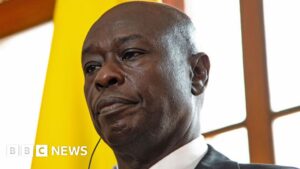‘You can try weirder and weirder things’: once-mocked synthesisers enjoy new golden era | Music
Queen refused to use them. The Musicians’ Union tried to ban them. Then computers overtook them. Synthesisers have been mocked, despised and discarded throughout their history, yet somehow they are entering a new golden era.
A new wave of synth makers has emerged, creating machines that are more ambitious and often quirkier than their bleep-making predecessors, feeding the appetites of an expanding pool of enthusiasts.
Thousands of them, including Portishead’s Adrian Utley, gathered this weekend in Bristol at Machina Bristronica, a festival “of knobs, buttons and discussions”, to play and even make devices that their designers believe sometimes cross the line from musical instruments to conceptual art.
Less than a decade ago, anyone hoping to discover the latest in electronic music-making had to make a pilgrimage to Berlin’s annual Superbooth fair, but now there are several in the UK. Last week saw SynthFest UK in Sheffield, and Synth East in Norwich opened its doors for the first time last year.
“Loads of people came into making electronic music via the computer,” said Ben Chilton, co-founder of Machina Bristronica. For the last 20 years, software such as Cubase, Reason and Ableton Live has made it easy for anyone to make music with a computer or even on their phones. Software synthesisers are heard in nightclubs everwhere.
“People sold their synths when computers were exciting, and after a few years they’ve been yearning for something they can touch,” Chilton said. The ability to shape sounds on the fly in a performance, rather than feeling like you’re programming a machine, is behind the resurgence of synth hardware, he added.
Synths have inspired generations of musicians in different ways. Pink Floyd created a menacing soundscape on Dark Side of the Moon with a synth that came in a briefcase. The Human League, Gary Numan and Cabaret Voltaire pioneered the 80s synthpop sound that was later supercharged by the Yamaha DX7. And while Donna Summer’s I Feel Love brought the Moog to disco, modern dance music would have been very different if DJ Pierre and Juan Atkins had not discovered they could push the Roland TB-303 – intended to be a bass replacement – into creating the squelchy sounds of acid house.
Modern synthesisers fall into two categories. Self-contained desktop synths usually have a keyboard and many knobs, dials and faders for the player to make the instrument swoop and soar. Then there are synths assembled from different modules – some to generate sounds, others to manipulate them. Modular synths can be simple affairs or extraordinary masses of cables and metal, like a £15,000 colossus created for film composer Hans Zimmer this year for his relaunch of the BBC Radiophonic Workshop. In 2013, Sound On Sound reported that there were about 730 modules available for Eurorack, which has become the modular standard. Now there are more than 16,000.
Yesterday also marked the 60th anniversary of the Moog modular, the first commercially available synth. Until 1964, anyone interested in the possibilities of electronic music had to build their own machines, as Delia Derbyshire did with the Radiophonic Workshop when she used tape and BBC test equipment to create the Doctor Who theme tune. Robert Moog’s synth was followed by the Buchla Easel.
“At first they were designed with home organists in mind, but by the mid-70s people worked out that they were instruments in their own right – [Jean-Michel] Jarre, Tomita, Vangelis,” said Oli Freke, a synth historian and author of Synthesizer Evolution.
Not everyone liked them. Some musicians feared being replaced and some bands took a stand. Queen put “No Synthesisers!” on the sleeves of four of their albums, and in 1982 the Musicians’ Union passed a resolution to ban
Now that almost any sound imaginable can be conjured from a computer, endless choice has driven creators towards more limited devices. Tom Whitwell, former editor of Mixmag, now makes synth modules as Music Thing, and will demonstrate his latest gear, a portable modular synth, at Machina Bristronica today.
after newsletter promotion
Rising interest in synths is due a to post-pandemic boom and the easy access to Chinese factories, said Whitwell, whose devices have been used by Thom Yorke from Radiohead, James Blake and Ryuichi Sakamoto.
“The barriers are much lower,” he said. “I can design something, send a couple of files to Shenzhen, then three weeks later these magic circuit boards will turn up for £25. It means you can try weirder and weirder things for very little risk.”
He will help Machina Bristronica attendees make a Mikrophonie, a musical joke inspired by Karlheinz Stockhausen that captures sounds of synthesiser switches with a microphone to feed back into the machine.
The key to synthesisers’ success is that they enable people to play again, said Jack Edwards of BeepBoop Electronics. “It reignites this spark of interest in your environment and the universe, like a child,” he said. “It’s a conversation between the player and the instrument. You tap into something that words can’t describe.”
#weirder #weirder #oncemocked #synthesisers #enjoy #golden #era #Music
News plays a pivotal role in our lives by keeping us informed and connected to the world. It serves as a critical source of information, offering updates on current events, politics, economics, science, and more. Through news, we gain awareness of global issues and local developments, helping us make informed decisions in our personal and professional lives. News also fosters discussion and debate, encouraging critical thinking and perspective-taking. Moreover, it promotes transparency and accountability among governments, businesses, and other institutions. In a rapidly changing world, staying updated with the news enables us to adapt to new challenges and opportunities, shaping our understanding of the complexities of society. Ultimately, news is not just about information; it empowers us to participate actively in the world around us, contributing to a more informed, engaged, and responsible global citizenry.
Health is fundamental to our well-being and quality of life, making it an essential aspect of daily existence. It encompasses physical, mental, and emotional aspects, influencing our ability to function effectively and enjoy life fully. Prioritizing health allows individuals to maintain optimal physical fitness, reducing the risk of diseases and promoting longevity. Mental health, equally crucial, affects our cognitive abilities, emotional stability, and overall happiness. Investing in preventive healthcare through exercise, balanced nutrition, and regular medical check-ups helps in early detection of potential health issues, ensuring timely intervention and treatment. Beyond individual benefits, a population’s health impacts societal productivity and economic stability. Governments and organizations worldwide emphasize public health initiatives to address pandemics, health disparities, and promote overall well-being. Ultimately, health serves as the foundation upon which we build our lives, influencing our ability to pursue goals, nurture relationships, and contribute meaningfully to society.
Money plays a crucial role in our lives as a means of financial security and freedom. It enables us to meet basic needs such as food, shelter, and healthcare, while also providing opportunities for education, travel, and personal growth. Beyond material comforts, money facilitates social connections and experiences that enrich our lives. It empowers individuals to invest in their futures, whether through savings, investments, or entrepreneurial ventures, thereby fostering economic stability and growth. However, the pursuit of wealth should also be balanced with ethical considerations, as money can influence relationships and societal dynamics. Responsible management of finances is key to achieving long-term goals and mitigating financial stress. Ultimately, while money is a tool for achieving aspirations and fulfilling desires, its true value lies in how it is utilized to improve both personal well-being and the broader community.
Earning Easy Money in 2024: Opportunities and Considerations 💸
In 2024, the landscape of earning easy money presents diverse opportunities, albeit with considerations. The digital age offers platforms for freelancing, online trading, and e-commerce, allowing individuals to leverage skills and creativity for financial gain. Cryptocurrency investments continue to allure with potential for quick profits, yet they entail high volatility and risk. Moreover, the rise of the gig economy enables flexible work arrangements through apps and websites, offering quick payouts but often without job security or benefits. Passive income streams such as rental properties and investments in stocks or bonds remain viable, but demand initial capital and ongoing management. Amid these options, caution is essential to avoid scams and unsustainable ventures promising overnight success. Ultimately, while the allure of easy money persists, informed decisions, diligence, and a long-term perspective are crucial for sustainable financial growth and security in the dynamic year ahead.





